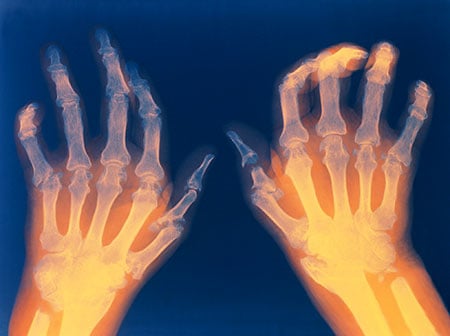Rheumatoid Arthritis is the most common form of the autoimmune types of arthritis and according to statistics, has a greater chance of occurring in women than in men. However, there is still little conversation around it. One of our followers, Iqra Khalid, is studying biomedical science in England and hopes to educate more people on the disease. Scroll down to read her explain what the condition is, and what are some key things to keep in mind about it:

What Is Rheumatoid Arthritis?
Rheumatoid Arthritis is a long term disease of joints. Normally, our immune system attacks bacteria and viruses to fight infections. However, in Rheumatoid Arthritis, our immune system mistakenly attacks healthy body tissues surrounding the joints. It induces inflammation of joints that cause swelling and damage nearby bones, cartilage (the tissue between bones), tendons (tissue connecting bone to muscle), and ligaments (tissue connecting bone and cartilage). Currently, no one knows what exactly causes this condition to develop.
The Symptoms:
- Joint pain and stiffness primarily occurs in the hand, feet, knee, and hip. But the neck, back, shoulder, and elbow may also be affected. Stiffness results in difficulty of movement. For example in the hand, it could result in it being painful to bend your fingers.
- Arthritis pain is always worse in the morning (lasts longer than 30 minutes) or after an inactivity time.
- Other symptoms include fever, weight loss and weakness.
- However, it is important to remember that symptoms vary from person to person.
Complications That Can Occur:
- Inflammation can spread to lungs, heart, eyes and blood vessels.
- Disability.
- Rheumatoid Arthritis and obesity together, increase the chance of developing diabetes and high blood pressure.

Factors That Increase the Risk
Genetic: Rheumatoid Arthritis may be present in families, but there is a low risk of inheriting it. However, maternal history is supposedly a stronger cause for arthritis transmission.
Hormones: Rheumatoid Arthritis in women is more common than in men. This may be due to the presence of oestrogen hormone, but research has not proved this.
Obesity: Obesity is a condition that causes extra fat to build up within the body. It’s linked with increased risk of developing Rheumatoid Arthritis. This association was more prominent among women than men.
Smoking: There is some evidence that smoking increases the risk of developing Rheumatoid Arthritis.
Diagnosis:
It is important to diagnose rheumatoid arthritis quickly, as early treatment can prevent it from getting worse. It is recommended that diagnosis and appropriate treatment should begin within 6 months of the onset of symptoms. A doctor will check your joints for any swelling, and inquire about your symptoms as well. In the case of Rheumatoid Arthritis, they will refer you to a specialist (rheumatologist) who will take blood tests, do scans, and guide you on the best possible prevention and treatment plan for you.
Even after diagnosis, there is a failure to take medications sometime. This is because they are thought to be associated with many side effects and are expensive. However, that results in poor performance and an inability to achieve therapeutic goals.
Living With Rheumatoid Arthritis:
While there is no cure for rheumatoid arthritis, early care and help can reduce the risk of joint damage and minimise the effects of the disease. Here are some things to apply in your daily lifestyle if you are diagnosed with it:
- It is advised to have a Mediterranean-style diet based on vegetables, fruits, legumes, nuts, cereals, grains, fish and unsaturated fats such as olive oil.
- Calcium and vitamin D supplements can also help if you are taking steroids as a treatment.
- Research has also found some evidence of reduced pain and stiffness by taking fish oil supplements.
- Daily exercise will help in reducing stress, losing weight, keeping your joints flexible, and strengthening the muscles that protect your joints. However, finding a balance between rest and exercise is crucial. Rest will make the inflamed joints feel more relaxed, but the joints will stiffen without movement. It is advised to try swimming, cycling, walking, and aqua aerobics.

Remember:
- Even if you don’t have the disease, you should educate the community about prevention and treatment.
- Take responsibility for your health – will power is the key.
- Follow up with your doctor to reduce the risk of developing complications, and to adapt to any changes in the treatment.
- Living with a long-term illness raises the risk of experiencing feelings like frustration, anxiety, anger, and disappointment. So never ignore your mental health and take support from people around you.
- When trying for a baby, men and women need to be wary about the medication they take. Always seek advice from a doctor and let them be aware that you’re trying so that they can offer advice accordingly.
- Treatments with heat and cold can help, such as hot/cold showers or hot/cold heating pads. Find what works for you, but keep in mind: cold treatments should not be used by people with low circulation!









What do you think?
You must be logged in to post a comment.